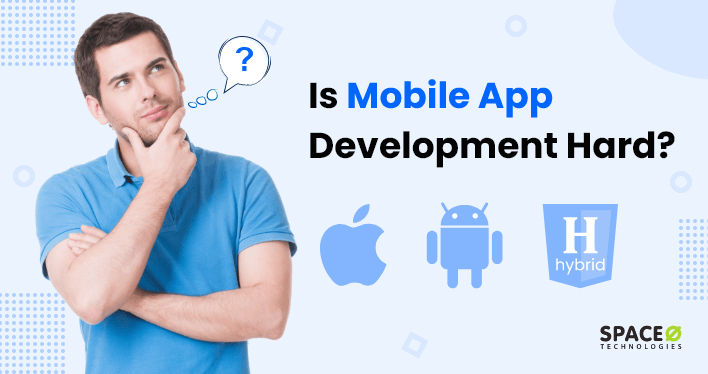This data will surprise you. The first app store came into existence in 2008. It comprised 500 apps at that time. A decade and a half later, we are talking about a billion mobile apps and users causing cutthroat competition in the mobile app industry.
Businesses are competing for mobile app development to distinguish themselves from the competition. Newer trends and needs are making the market even more competitive.
People believe that this is the best time to invest in mobile applications. Developers are flexing their Avenger-like superpowers and gawking at businesses for partnerships.
If you are still contemplating if investing in a mobile app is a good idea, then this blog is for you.
But, is mobile app development hard?
Being one of the top mobile app development services providers, we can help you with a detailed and proper answer.
Table of Contents
Is Mobile App Development Hard?
The answer is both- yes and no.
We will start with answering why we said no.
To answer your question, is app development hard? If you know the mobile app development process and have the path defined, things are not so challenging.
Apart from that, app developers get a $5000 cash bonus per year according to Indeed.
Programming Multiple Sensors
You create a mobile app using multiple mobile devices and sensors. The application will help the devices communicate with other hardware and sensors over the internet connection.
Now, imagine the sensor is not working when the mobile app is fired up, it can cause friction in experiences. The user might think the app is not working if you don’t let them know the device has issues.
Similarly, network connectivity plays a pivotal role in ensuring that the device is connected over the active Internet connection with the mobile app.
As a mobile app developer, you need to define multiple scenarios for every logic and program. This will help you ensure that the app is ready for all cases.
Example of Programming Multiple Sensors Explanation The Robot Vacuum Cleaner This is an apt example of all the scenarios where the mobile app can fail. In case the connection is not made, the mobile app should show that the robot is offline. In case there are issues while cleaning, the app should specify them. Every part of the robot should be connected for better revelation. Device Fragmentation
Most developers fear this part of the app development process. When you are developing for Android, the multiple devices differ in size, form factor, and resolution. You are dealing with countless devices.
So, what’s the challenge? You need to make sure that the experience of using the app across these devices remains similar. Whether the person is using the application on the latest One Plus device or a Samsung tablet, they should be able to note the uniformity.
This leads to developing multiple resolutions and testing them out. It means a great deal of work with no room for error.
The chances of bugs attracting your workspace are high. Add to Android, your iOS, and other devices, you have a whole load of work to worry about.
Example of Device Fragmentation Explanation Instagram Mobile App If you open Instagram on your tablet or mobile phone, the screen matches the resolution and device size needs. it showcases a uniform interface and is designed to meet the device requirements. This is the result of going with hybrid apps over native apps. OS Versions
While we are talking about device fragmentation, we cannot ignore the specific mobile operating system and SDK upgrades. As of Dec 2022, Android 12.0 has covered 28.22% of the market share. There is a lot of fragmentation here. For instance, the same application can work on the older and newer version of a single operating system.
The challenge that most mobile app developers face is ensuring support for the older versions. That can take up a lot of your time.
This adds up the word and increases the average time to build a mobile application.
Flexibility or Rigidity with SDK
While SDKs have made programming fast and easy for developers, there is a certain level of rigidity that comes with the SDK. You cannot introduce the touch or swipe outside their ability. If you want to use movements that aren’t part of the SDK, it can become difficult.
With SDK, the transition between screens requires extra work and logic. As a result, despite SDKs offering accelerated software development, they tend to bring in rigidity.
Knowledge of Programming Languages
Choosing a programming language depends a lot on the approach you plan to take for mobile app development. For example, if you are planning native applications, you can do both Android and iOS app development. For Android apps, you need proficiency in Kotlin and Java. You should know how to work with Android Studio.
On the other hand, if you are developing with iOS, you should be proficient with Objective-C and swift.
In case you are planning to develop for multiple platforms, you should know how to use top mobile app development frameworks. This can add to the complexity of hiring. Without direction, you are like a raging bull walking everywhere they see red. Unlike web-based frameworks that work on browser-supported languages, mobile applications need specific coding skills and framework understanding.
Want to Develop Custom Mobile App?
Consult with our app developer for 30 mins, share your requirements, and develop a fully functional app.

Frustrated End Users
Despite the best development efforts, you will find yourself tied up with frustrated users, who are ready to churn away. They want nothing more than to leave your app behind.
In many cases, developers do not regard mobile app users as important when building solutions. There are solutions where the customer needs more than what you have provided. They may try reaching out but, with no response, it can lead to abandonment.
This has led many app developers to a stage of frustration. A poor experience, limited features, and a high learning curve can put your customers off, and in turn, make app development difficult.
Example of Frustrated End Users Explanation Multiplayer Mobile Gaming App In this application software, multiple players are playing from different mobile phones. Interrupted play can cause friction. It is equally important to ensure the user interface is designed irrespective of the mobile device or mobile platforms used by the user. Need for Multithreading
When you are developing a mobile application, you aren’t creating it for a single type of user. Your user varies in their usage, needs, and even behavior. As part of the software architecture, you are not just multithreading the application for the different users but also multiple requests.
Each component and logic has to be multithreaded using the rigidity of the framework. As a result, you will notice that the time is taken to develop the application increases. It also results in more work and frustration. Unlike desktop or web apps, mobile apps require more time and effort.
Bandwidth and Memory
Unlike web applications that run on web browsers, mobile application development involves storing data locally. In iOS development or app for the Android platform, you tend to connect the frontend with the backend server, which can consume a lot of memory. At the same time, you need to ensure the software applications run in offline mode, and the requested data is processed at the speed of light.
The computer program designed for specific platforms can occupy a lot of space, which can consume battery and bandwidth. Eventually, users may choose web applications in the race between mobile and web apps.
Above we discussed some of the reasons why is mobile development difficult. Next, understand the following 4 steps to make mobile app development easier.
Have a Mobile App Idea?
We have built more than 4400 mobile apps. Discuss your app requirement with our app development consultant and get a personalized free quote.
4 Easy Steps to Make Mobile App Development Easier
Is developing an app hard? Learn mobile app development, identify how it differs from web application development, and identify the best practices to build apps. Learn mobile app development, identify how it differs from web application development, and identify the best practices to build mobile apps.
Also, hiring a dedicated developer, ease your burden and manage app development efficiently. Here are all the things that can enable developers to build the app design that improves experiences.
Understand Your Users Before Starting Application Development
Your end users are core to the Android and iOS apps you are building. If you don’t know who your users are, and how they consume native and web apps, it can cause chaos during development.
- Start by identifying the target market
- Know the different user segments and how each one consumes the software
- Check out all the applications they use
- Determine the gaps they feel exist in the current applications.
Define the Roadmap
You cannot build your mobile app without the underlying business logic. Similarly, iOS and Android developers should have a fixed roadmap that can help translate the vision into a complete mobile application.
At this point, you will need to determine the scope of work, the technology you would use, and individual software units for the application.
Design the UX
Unlike the web developer, the mobile developer needs to pay more attention to the end user. They should know if the app user is likely to wait for the app, and how long. Again the web application server differs from mobile servers; as a result, the execution and process requests would be different for mobile apps. Since, the appropriate web application server sends static content such as HTML pages, videos, and images. As it is utilised and equipped with static content.
Identifying the way a user carries the mobile and helping you in good app design practice.
Hire the Right Team
Learning mobile app development and creating application software specifically designed for the users is no child’s play. We have discussed the issues that can come when you are developing the solution.
That’s why it is important to manage the appropriate mobile app development team structure. You should also have a project manager to helm the development. Popular mobile apps have gained success in terms of downloads and users by outsourcing app development.
Still, have questions related to challenges in mobile app development? Check the FAQ section to know more.
FAQ About the Complexity of App Development
Is mobile development harder than web development?
Yes, mobile development is complex in comparison to web development. For more clarity, learn about the core differences between app development and web development. The learning curve of mobile app development is difficult compared to web development. Also, mobile app development is platform specific, therefore, you require different skill sets and expertise to develop mobile apps for Android and iOS.
Is mobile app development a good career?
Yes, mobile app development is a good career option to choose. According to salary.com, the average mobile app developer earns between $84,877 to $111,820 based on their skill set and competencies. The companies are hiring mobile app developers to develop mobile apps for their products and clients. Even, you can build your own mobile app and start your business by learning mobile app development.
Which is easy web development or app development?
Mobile app development is comparatively more difficult than web development. As mobile apps are platform-specific, and mobile apps require to be built from scratch in design and development. Unlike web development, where you can directly customize templates and upload the files to the server.
How much do app developers make?
Mobile app developers make between $87,669 on average in the USA. However, it can become difficult if you are starting out or have no defined roadmap for app development. Let’s take you through all the reasons why is mobile development difficult.
How to become a mobile application developer?
Step 1 – Choose the mobile app development platform on which you are planning to develop your mobile app
Step 2 – If you are a web developer and want to learn mobile app development, you need to learn app development technologies such as Flutter, React Native, and Xamarian.
If you are planning to develop mobile apps in Android, learn Java or Kotlin. If you are planning to build apps in iOS, then you need to learn Swift or Objective C.
Step 3 – Practice your coding skills by completing demo projects in Android and iOS. Also, you can use mobile app development software to download the templates to start developing mobile apps.
Which is easy web development or app development?
Mobile app development is comparatively more difficult than web development. As mobile apps are platform-specific, and mobile apps require to be built from scratch in design and development. Unlike web development, where you can directly customize templates and upload the files to the server.
Do You Think App Development is Hard?
Developing an application for mobile is challenging. It can take you anywhere between several weeks to months to get the ideal Android app out for business requirements. You need to take care of the personal preference of the users, business requirements, and the approach that best fits the requirement.
Whether you are building a clone or developing an application for multiple platforms from scratch, there are too many things that add to the complexity.
Space-O Technologies has the expertise and a successful portfolio that makes app development easy and effortless. Our team ensures a low learning curve and enhanced downloads post-deployment. Connect with us with your requirements.




